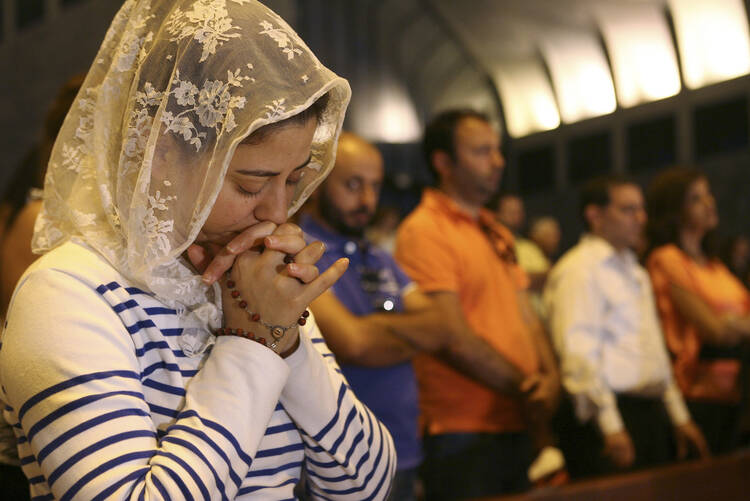The future of the Middle East will depend on nations coming together to promote dialogue and development in the region and on local Christians staying active in society and politics, a top Vatican official said.
The international community cannot remain "inert or indifferent before the dramatic situation" unfolding in the Middle East because it has a special responsibility to "guarantee the presence of Christians and other minorities" in the region, said Archbishop Paul R. Gallagher, the Vatican's foreign minister.
Countries "must go to the root of the problems, even recognize the mistakes of the past and try to promote a future of peace and development" by putting the human person and the common good before all else, he said April 30 during an ecumenical conference on "Christians in the Middle East: What Future?" The Vatican newspaper published the archbishop's speech May 2.
History has shown that choosing violence over dialogue and negotiations only multiples people's suffering, he said at the conference, which was organized by the Sant'Egidio Community in Bari, southern Italy, April 29-30.
In addition to needing more diplomatic efforts and development, more also must be done to stop the trafficking of arms to the region, he said.
The region's Christians, who are experiencing increasing hardship and persecution in the area, are an important presence as they can "offer everyone a sign of hope and comfort" and build together with their fellow citizens "a more just and human society," he said.
"From this perspective, the role of the family and laypeople in general is very important," he said, emphasizing that greater formation in church teaching is needed so they can "take on responsibilities in the fields of politics and economics."
While the lay faithful in every nation must be active in their communities and government, the archbishop said, the very difficult situation in the Middle East means remaining there "must be seen as a unique vocation."
This is why Christians "must be encouraged to stay," and the church must offer all kinds of support, including spiritual and economic.
Catholic Relief Services, the U.S. bishops' relief and development agency, has been working to support the Catholic Church in the Middle East so it can improve and expand the help it offers to those fleeing the violence and insecurity in Syria, Iraq and elsewhere.
"We support the church and its institutions, like schools and clinics, so they can play a bigger role in society" and help rebuild their country and assist those in need, said Kevin Hartigan, CRS' regional director for Europe, the Middle East and Central Asia.
It is important that people not see Christians as helpless victims; "the church is not shriveled up in a corner," hiding in fear, but is courageously present and offers an enormous amount of assistance considering its small size, he told Catholic News Service by phone from Baltimore May 4.
"The church has always played a huge role, especially in civic leadership," education and health care, and now, during a time of such great need, it has been taking the lead and proving "its continued relevance," he said.
"The solidarity between communities is very strong, there is a lot of mutual support and protection," especially between displaced Christians and the Yezidi religious minority in northern Iraq, for example, he said.
Christians found refuge with Yezidis after Islamic State fighters swept through Mosul and the Yezidis are now being cared for by Christians further north after their communities fell into militants' hands, he said.
Hartigan said people in Iraq and Syria "grew up in a multifaith context and they have a lot of nostalgia for that" time when people of all faiths lived neighbors in peace.
"Now their exile is multifaith and they are really taking care of each other" once again, but this time in their mutual suffering and need, he said.
CRS is able to provide critical educational programs—something many international aid organizations do not do "either because they don't have the skills or they lack the long-term presence" that building a school or running such a program would involve, he said.
The church, religious institutes and the local Caritas are part of local communities and not dependent "on a six-month grant" that expires, he said.
CRS "plays on the strengths of the local church, especially by focusing on education. These are societies that really value education," he said, and parents are particularly anxious about their children missing school, being uprooted and facing psychological distress.
Providing schooling and other programs for kids helps families achieve a little bit of "normality," he said, and helps parents have some time away from their kids so they can try to earn some money or "manage life in exile."
Hartigan, who has been with CRS for more than two decades, said "it's a total pleasure to represent the U.S. Catholic Church" in these nations in need.
"The level of hospitality from really destitute people is really humbling" and the fact that they receive such a warm welcome by people of so many different faiths shows "how much respect people have for the Catholic Church."
It goes to show "how much the Catholic Church has played such a positive role" in these countries, he said.








